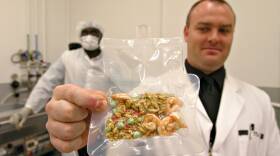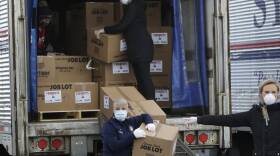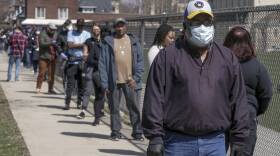EXPLORE MORE
Wednesday on BPR, live from the BPL:
GBH executive arts editor Jared Bowen
Harvard national security expert Juliette Kayyem
Marty Martinez, head of the United Way of Massachusetts Bay
Naturalist and author Sy Montgomery
Olga Cherevko from the United Nations Office for the Coordination of Humanitarian Affairs, on the ground in Gaza
Recent segments
-
Art Caplan: Rationing Guidelines Reflect Inequities Of Healthcare System, But Are 'What You've Got To Do'
Massachusetts' new guidelines for rationing medical resources prioritize young and otherwise healthy people. -
Chris Muther And Cat Mrs. Davenport Review Freeze-Dried Meals For Social Distancing
The travel writer gave highest marks to the freeze-dried beef stroganoff -
D’Amato Says Food Bank Supplies Are OK, Despite 50% Demand Increase
The Greater Boston Food Bank president said she’s mostly concerned with keeping workers safe from COVID-19. -
Carol Rose: The ACLU Is Calling For An Equitable Response To The Coronavirus Pandemic
Massachusetts should release racial data for COVID-19 response, says civil liberties union. -
John King Hopes Wisconsin Primary Opens Dialogue About Remote Voting
Voters are waiting in long lines to vote in the presidential primary on Tuesday, as the Governor's push to delay the election in the name of public health was denied. -
What Happens To Tom Brady If The NFL Season Is Canceled?
Will Brady ever get to step out onto field with his new team, if the 2020 NFL season is cancelled due to the coronavirus?
Listen to previous shows
-

Paul Reville Calls For 'Flexibility' From Teachers Unions, Management Over School Reopenings
Massachusetts’ largest teachers unions strategy for urging fully remote learning in the state this fall hit a snag when a teacher strike in Andover was ruled illegal by the state’s labor board, after the union instructed teachers not to enter school buildings for a staff training last week. Paul Reville told Boston Public Radio on Thursday he agreed with the labor board’s decision, though acknowledged that there is no unified front on either side of the issue. “There’s a lot of tension now between the unions’ understandable and justifiable role in protecting their members’ health and interests, and school districts pushing hard to reopen school, with a lot of parents feeling they want to see their children back in school,” he said. State law prohibits public employees from striking, and the labor relations board determined that the union overstepped its authority when it tried to unilaterally dictate where teachers perform their work. “I’m looking, I know a number of people are looking for flexibility, both from management and labor, in getting to a set of agreements that takes into account the needs of children and families in this moment,” he said. The ruling comes as a number of districts are still negotiating how to start school this fall. Reville is former Secretary of Education and a professor at Harvard University’s Graduate School of Education where he also runs the Education Redesign Lab. His latest book, co-authored with Elaine Weiss, is “Broader, Bolder, Better: How Schools and Communities Help Students Overcome the Disadvantages of Poverty.” -

BPR Full Show 9/9/20: Warped
Today on Boston Public Radio: MIT economist and Affordable Care Act architect Jonathan Gruber discussed concerns that a rushed COVID-19 vaccine could exacerbate vaccine skepticism in the U.S., and other political quandaries surrounding Operation Warp Speed. We opened lines to ask listeners: what would it take to get you on board with an American-made coronavirus vaccine? CNN’s Brian Stelter discussed his latest book, "Hoax: Donald Trump, Fox News, and the Dangerous Distortion of Truth.” National security expert and CNN analyst Juliette Kayyem discussed controversial acknowledgments made by the president in a forthcoming book from veteran journalist Bob Woodward, and her latest piece in The Atlantic, called "The Emotionally Challenging Next Phase of the Pandemic." Medical ethicist Art Caplan weighed in on the thousands of Americans attending Donald Trump rallies without masks, and ethical questions raised by a new drug claiming to treat a common form of dwarfism. Food writer Corby Kummer discussed data from the Massachusetts Restaurant Association indicating that 20% of Mass. restaurants have closed permanently because of the COVID-19 pandemic, and thoughts on fellow food writer Tom Philpott’s new book, “Perilous Bounty: The Looming Collapse of American Farming and How We Can Prevent It." We opened lines to ask listeners: are you ready to continue eating outside at restaurants during the fall and winter? -

Kayyem Weighs in on ‘Deadly Interesting’ Revelations from Bob Woodward’s ‘Rage’
National security expert Juliette Kayyem made her weekly appearance on Boston Public Radio Wednesday, where she touched on reporting from veteran journalist Bob Woodward’s forthcoming book, “Rage,” which includes an acknowledgment from President Trump that he understood the looming severity of the COVID-19 pandemic back in February, at the same time he was publicly claiming the virus would “disappear." "Trump never likes to be wrong,” she said. "And so what was interesting to me about his claim that he always knew how bad it was going to be, is that even though it’s against self-interest… in some ways it satisfies his own narrative about himself, which is ‘I’m never wrong.’" "I think that that’s so interesting… deadly interesting, that that’s how his brain actually works,” she said. “He’d rather be accused of lying than be accused of being wrong." Kayyem also discussed her latest piece in The Atlantic, "The Emotionally Challenging Next Phase of the Pandemic," and whether she believes the president's latest string of scandals will influence swing voters in November. Kayyem is an analyst for CNN, former assistant secretary for the Department of Homeland Security, and faculty chair of the homeland security program at the Harvard's Kennedy School of Government. -

Corby Kummer Warns More Restaurants 'Will Die’ Without Dramatic Action
Food writer Corby Kummer joined Boston Public Radio on Wednesday, where he discussed new data from the Massachusetts Restaurant Association indicating the state has already lost a fifth of its restaurants to revenue losses resulting from the COVID-19 pandemic. Kummer warned that while the numbers are tragic, this forthcoming winter season could prove even grimmer for Mass. restaurants. "Until Spring… we’re not going to have an accurate count, an accurate figure – and I think that’s the news we’re going to be bracing for,” he said. “Many restaurants this winter, unless something changes dramatically, will die." During the interview, Kummer also touched on his recent New York Times review of Tom Philpott’s “Perilous Bounty: The Looming Collapse of American Farming and How We Can Prevent It,” and an NPR report about the alarming percentage of low-income kids not getting government-subsidized meals through the pandemic. Kummer is a senior editor at The Atlantic, an award-winning food writer, and a senior lecturer at the Tufts Friedman School of Nutrition and Policy. -

Caplan: Vaccine Trials Cannot Be Rushed, Regardless Of Political Pressure
The pharmaceutical company AstraZeneca has halted the late stage trial for a COVID-19 vaccine this week due to a suspected adverse reaction in a participant. Medical ethicist Arthur Caplan told Boston Public Radio on Wednesday the participant developed an inflammation of the spinal cord and had to be hospitalized, causing the company to pause the trial in order to conduct a safety review and determine whether the reaction was in fact caused by the vaccine. Caplan said the takeaway from this latest development is that medical trials cannot be rushed, no matter the political pressure to quickly develop a vaccine. “We want to vaccinate our way out of this thing and people keep spinning tales it’ll be here in October,” he said. “I keep saying no it wont, it’ll be here next year, and I don’t know when, but maybe the end of the year … because you’ve got to collect this data.” Art Caplan is the Drs. William F. and Virginia Connolly Mitty chair and the director of the division of medical ethics at the NYU Grossman School of Medicine.









